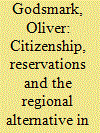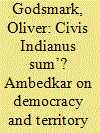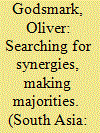|
|
|
Sort Order |
|
|
|
Items / Page
|
|
|
|
|
|
|
| Srl | Item |
| 1 |
ID:
139461


|
|
|
|
|
| Summary/Abstract |
This paper unearths an alternative paradigm through which to consider the discussions and debates between members of the Indian public, government bureaucrats and Congress Party politicians about the rights and interests of Indian citizens both before and immediately after India's Independence in 1947. It argues that much of the recent historical work on citizenship during this period has been preoccupied with issues of nationality and religious community as a result of the fallout from Partition. However, the demands and deliberations over the introduction of provincial forms of affirmative action in the all-India services at this time are indicative of a different narrative. First, many provincial representations of ‘minority’ rights often took into account differences of caste and language instead. Second, and perhaps more importantly, the term minority was employed not only to describe demographic minority status, but also to define under-represented groups in the all-India services. In doing so, these different provincial policies prioritised particular local rights to representation, in which citizenship was expressed through a regional idiom.
|
|
|
|
|
|
|
|
|
|
|
|
|
|
|
|
| 2 |
ID:
172006


|
|
|
|
|
| Summary/Abstract |
This article considers Ambedkar's ideas about the implementation of democracy in India, in the context of the linguistic reorganization of provincial administrative boundaries. In doing so, it looks to emphasize the importance of territorial configurations to Dalit politics during this period and, in particular, the consequences of ‘provincialization’, which has received little attention within the existing literature. Rethinking space by redrawing administrative territory provided Ambedkar with one potential avenue through which to escape the strictures of Dalits’ minority status. In this vision, linguistic reorganization (and partition) were harbingers of greater democratization and potential palliatives to the threat of Hindu majority rule at the centre. In turn, however, Ambedkar simultaneously came to perceive the creation of these new administrative spaces as marking a new form of provincial majoritarianism, despite his best efforts to form alliances with those making such demands. In this sense, the article also seeks to address some of the shared processes behind linguistic reorganization and partition as two related forms of territorial redrawing. In the face of these demands, and the failures of both commensuration and coalition politics, Ambedkar turned to the idea of separate settlements for Dalits, whereby they might themselves come to constitute a majority. Whilst such a novel attempt at separation and resettlement was not ultimately realized, its emergence within Ambedkar's thought at this time points towards its significance in any history of caste and untouchability in twentieth-century South Asia.
|
|
|
|
|
|
|
|
|
|
|
|
|
|
|
|
| 3 |
ID:
164045


|
|
|
|
|
| Summary/Abstract |
This paper re-examines the demand for Pakistan as part of a wider ‘federal moment’ in India by addressing its connections with the contemporaneous calls for Samyukta Maharashtra in the context of the Cabinet Mission of spring/summer 1946. It highlights how the twinned processes of democratisation and provincialisation during the inter-war years informed these demands. Both Muslim and Maratha representatives looked to locate and create autonomous political spaces that would better secure their political representation. Their demands exemplified a shift away from a commensurative logic expressed through separate representation in the legislatures towards support for majority rule at the provincial level.
|
|
|
|
|
|
|
|
|
|
|
|
|
|
|
|
|
|
|
|
|